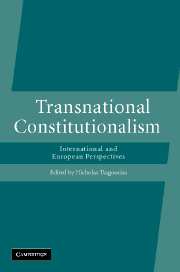Book contents
- Frontmatter
- Contents
- List of contributors
- Foreword by Malcolm D. Evans
- List of abbreviations
- Introduction – Constitutionalism: a theoretical roadmap
- Part I States, courts and constitutional principles
- Part II Transnational constitutional interface
- 5 Hierarchy in organisations: regional bodies and the united nations
- 6 The multilevel constitution of European foreign relations
- 7 Self-determination of peoples and transnational regimes: a foundational principle of global governance
- 8 Challenges to international and European corporatism presented by deliberative trends in governance
- Part III Visions of international constitutionalism
- Index
7 - Self-determination of peoples and transnational regimes: a foundational principle of global governance
Published online by Cambridge University Press: 01 July 2009
- Frontmatter
- Contents
- List of contributors
- Foreword by Malcolm D. Evans
- List of abbreviations
- Introduction – Constitutionalism: a theoretical roadmap
- Part I States, courts and constitutional principles
- Part II Transnational constitutional interface
- 5 Hierarchy in organisations: regional bodies and the united nations
- 6 The multilevel constitution of European foreign relations
- 7 Self-determination of peoples and transnational regimes: a foundational principle of global governance
- 8 Challenges to international and European corporatism presented by deliberative trends in governance
- Part III Visions of international constitutionalism
- Index
Summary
Introduction
In the era of globalisation, and due to the transition from ‘government’ to ‘governance’, the content and function of international law and its legal principles, including self-determination, need to be reassessed. If, indeed, self-determination of peoples has been the legal avenue for achieving statehood, self-determination of international sectoral or integration regimes (transnational regimes) constitutes its further development, enabling the stabilisation of regional or global governance structures. Self-determination, which was proclaimed as a political principle in the aftermath of World War I and, following the adoption of the Charter of the United Nations (UN), evolved into a legal principle, is now assuming the rank of a foundational constitutional principle of global governance.
The principle of the self-determination of peoples has transcended the limits of a group right and has become a principle for the allocation and organisation of territorial authority in global society; this subject will be addressed in the next section. Moreover, as concomitant of the fragmentation of international law, self-determination permeates the operation of transnational regimes, a development which is discussed in the section following and which is visible in the representative examples of the regional integration regime of the EU and of the global sectoral WTO regime.
The intrinsic connection between these two spheres is apparent, if we consider that the transformation of the self-determination of peoples and the emergence of the self-determination of regimes are parallel developments merging into a principle of global governance.
- Type
- Chapter
- Information
- Transnational ConstitutionalismInternational and European Perspectives, pp. 207 - 268Publisher: Cambridge University PressPrint publication year: 2007
- 4
- Cited by



